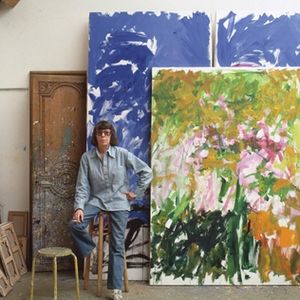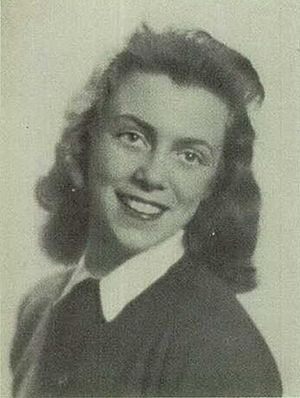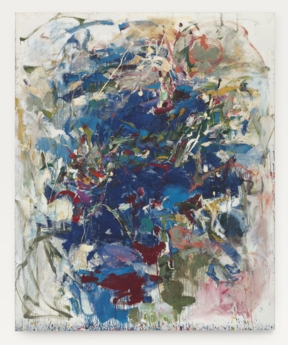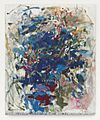Joan Mitchell facts for kids
Quick facts for kids
Joan Mitchell
|
|
|---|---|

Mitchell in 1983
|
|
| Born | February 12, 1925 |
| Died | October 30, 1992 (aged 67) American Hospital of Paris,
Neuilly-sur-Seine, France |
| Education |
|
| Known for |
|
| Movement | |
Joan Mitchell (born February 12, 1925 – died October 30, 1992) was an American artist. She mostly worked with painting and printmaking. She also used pastel and made other art on paper.
Joan Mitchell was part of the New York School group of artists in the 1950s. She was born in Chicago, Illinois. She is known for her connection to Abstract Expressionism. This was an art movement where artists painted with strong emotions and bold brushstrokes. Even though she was American, she lived in France for much of her life.
Mitchell's art showed strong feelings. Her bold brushstrokes were inspired by painters like Henri Matisse. She often painted what she remembered from landscapes. She once said, "I carry my landscapes around with me." Her later work was affected by her health challenges.
Joan Mitchell was one of the few women painters of her time to become very famous. Her paintings and drawings are in museums all over the world. They have also sold for very high prices. In 2021, two major museums held a large show of her work.
After she died, the Joan Mitchell Foundation was created. This group helps other artists. It also keeps her artworks and records safe.
Contents
Growing Up and Learning About Art
Joan Mitchell was born in Chicago, Illinois. Her father, James Herbert Mitchell, was a skin doctor. Her mother, Marion Strobel Mitchell, was a poet.
As a child, Joan loved diving and skating. This love for sports showed in her art. One gallery owner said she painted "almost like a competitive sport." She often took art classes at the Art Institute of Chicago. Later, she spent summers at an art camp run by the Institute called Ox-Bow.
She went to high school at Francis W. Parker School. She was good friends with her classmate Edward Gorey. They stayed friends even when they were older.
Mitchell studied at Smith College in Massachusetts. She also went to the Art Institute of Chicago. She earned her art degrees there in 1947 and 1950. In 1947, she moved to Manhattan. She wanted to study with a famous teacher named Hans Hofmann. But she only went to one class. She said she "couldn't understand a word he said."
In 1948, she won a special award that let her travel. She studied art in Paris and Provence, France. She also visited Spain and Italy. During this time, her art became more and more abstract. This means her paintings did not show real objects.
In 1949, Mitchell married Barney Rosset in France. They moved back to New York City later that year. They divorced in 1952.
Starting Her Art Career in New York
In 1950, Joan Mitchell painted her last picture with a person in it. It was called Figure and the City. After that, she focused only on abstract art.
Throughout the 1950s, Mitchell was a key artist in the New York School. She was part of the Abstract Expressionist movement. She had her art studio in Greenwich Village. She often visited places where artists gathered, like the Cedar Tavern. She also went to The Club, a special meeting place for artists.
Mitchell talked a lot about art with other painters. These included Philip Guston, Franz Kline, and Willem de Kooning. She admired their work. She visited their studios, and they visited hers. They often had meals together and discussed painting.
Mitchell was one of the few women artists of her time to become well-known. Other famous women artists included Lee Krasner and Helen Frankenthaler.
In 1951, Mitchell's art was shown in a very important exhibition. It was called the "Ninth Street Show." This show also featured famous artists like Jackson Pollock and Willem de Kooning. Mitchell's friends helped her carry her large painting to the show. They thought her work was excellent. Her first solo art show was in New York in 1952.
By the mid-1950s, Mitchell started spending more time in France. But she still showed her art often in New York. She had many solo shows at the Stable Gallery. Mitchell said that some male artists were supportive of her. But she also felt that being a woman in art caused some challenges.
In 1955, Mitchell met Canadian painter Jean-Paul Riopelle in Paris. They had a long relationship until 1979. They lived in separate homes but often spent time together.
In 1956, Mitchell painted Hemlock. She named it after a poem that gave her a "dark and blue feeling."
In 1957, a major article about Mitchell's art appeared in ARTnews. The writer said Mitchell wanted to express feelings. He noted that nature was a big inspiration for her work.
Painting in France
By 1959, Mitchell was living full-time in Paris, France. She had a studio there. Her paintings were shown in many big international exhibitions. These included shows in Japan, Italy, and at the Venice Biennale. She also started showing her art in Paris with Galerie Jean Fournier. This gallery became her main dealer in Paris for over 30 years.
In the early 1960s, Mitchell had solo shows in Paris, Milan, and Switzerland. Her work was also in many group shows across Europe and Japan.
From 1960 to 1964, Mitchell's painting style changed. She used darker colors and thick areas of paint. Her brushstrokes were very strong. She sometimes even used her fingers to spread the paint. Mitchell described her art from this time as "very violent and angry." But by 1964, she wanted to move to a different style.
In 1967, Mitchell inherited money after her mother passed away. She used it to buy a large property in Vétheuil, France. This town was near Giverny, where the famous painter Claude Monet lived. Mitchell bought the house because it was good for her 13 dogs. She lived and worked there for the rest of her life. The views of the Seine River and her gardens in Vétheuil often appeared in her art.
Mitchell often invited artist friends from New York to visit her in Vétheuil. Painter Joyce Pensato said Mitchell wanted to help young artists.
In 1968, Mitchell began showing her art with the Martha Jackson Gallery in New York. In 1972, she had her first big museum show. It was called My Five Years in the Country. The show featured her "Sunflower" paintings. Critics loved the exhibition. One writer said Mitchell would be known as one of the best American painters of her time.
In 1969, Mitchell finished her first large painting made of three panels. It was called Sans Neige (Without Snow).
In 1976, Mitchell started working with New York art dealer Xavier Fourcade. He was her dealer until he died in 1987.
In 1979, Mitchell created two of her most famous large works. These were La Vie en Rose and Salut Tom. La Vie en Rose was named after a famous French song. A critic described it as having strong black and blue brushstrokes mixed with soft pinks.
Later Years and Passing
In 1982, Joan Mitchell became the first American woman artist to have a solo show at the Museum of Modern Art in Paris. She had many artist friends in Paris.
In 1984, Mitchell faced serious health issues. She had a successful treatment, but it left her with some challenges. Her paintings after 1985 showed how these health changes affected her. She also developed osteoarthritis in her hip. She had surgery in 1985, but it did not fully help. During her recovery, she started painting with watercolors. She had to work on smaller paintings because of her health. Her River series of paintings comes from this time.
Around this time, her New York art dealer, Xavier Fourcade, also became ill. They traveled to France to see a Matisse exhibition. This trip inspired Mitchell's Lille series of paintings. After Fourcade's death in 1987, she painted the Chord series.
In 1988, a major show of Mitchell's work toured the United States. It was called The Paintings of Joan Mitchell: Thirty-six Years of Natural Expressionism. Mitchell called it being "art-historized live."
Mitchell had two popular solo shows at the Robert Miller Gallery in New York. The first was in 1989, and the second in 1991. A critic from The New York Times called her paintings "self-portraits."
In her last years, Mitchell painted sunflowers again. Her painting Sunflowers, 1990–91 was made to show the feeling of a dying sunflower.
In October 1992, Mitchell traveled to New York for an art exhibition. There, doctors found she had advanced lung cancer. She returned to Paris and passed away on October 30, 1992, at the American Hospital of Paris.
Her Art Style and Inspirations
Joan Mitchell always painted in an abstract style, from the early 1950s until she died in 1992. She spent many years visiting the Art Institute of Chicago as a child. She looked at paintings from the 1800s.
Mitchell said that Paul Cézanne, Wassily Kandinsky, Henri Matisse, and Vincent van Gogh influenced her. She once said, "If I could paint like Matisse, I'd be in heaven." Her paintings were often very large, sometimes made of many panels joined together.
Her main ideas for art came from her memories and feelings about landscapes. She painted mostly with oil paints on canvas. She used bold, strong brushstrokes. She described a painting as "an organism that turns in space."
Art experts say her paintings show many different feelings. She used thick and thin paint, bright and dark colors. All these choices helped show meaning and emotion.
Mitchell said she wanted her paintings "to convey the feeling of the dying sunflower." She also said some of them looked "like young girls, very coy." She put her feelings into her artwork. She even compared these feelings to poetry.
Her Lasting Impact
The Joan Mitchell Foundation
In her will, Joan Mitchell asked for a foundation to be created. This group would help artists and keep her art history safe. The Joan Mitchell Foundation started in New York in 1993. It gives money and support to artists in the U.S. More than 1,000 artists have received help from the Foundation.
The Foundation also helps artists learn how to document their work. It teaches them how to manage their art collections. In 2015, the Joan Mitchell Center opened in New Orleans, Louisiana. It is a place where artists can live and work for a while. Many famous artists have been part of this program.
The Foundation also takes care of Mitchell's own artworks. It keeps her letters, photos, and other important papers. In 2015, they started a project to list all of Mitchell's paintings. This will create a complete record of her work.
Important Art Shows
Mitchell's art was shown in big exhibitions in 1961 and 1974. A major show of her work toured in 1988 and 1989. In 2002, a large show called The Paintings of Joan Mitchell opened at the Whitney Museum of American Art. A friend of Mitchell's wrote that her art showed a "passionate inner vision."
In 2015, a show called Joan Mitchell Retrospective: Her Life and Paintings was held in Austria and Germany.
In September 2021, a very big show called Joan Mitchell opened in San Francisco. It then traveled to Baltimore and Paris. A critic from The New York Times said the show proved how Mitchell created her unique style.
Joan Mitchell's art is now in over 100 museums and public places around the world.
Art Market Success
Mitchell's art has been very successful in sales. This was true when she was alive and after she passed away. Between 1960 and 1962, she earned over $30,000 from art sales. This was a lot of money for a woman painter at that time.
When she died in 1992, she was represented by two art galleries. These galleries continued to show her work. Later, the Joan Mitchell Foundation chose new galleries to represent her art.
Art Auctions
In 2007, a painting by Mitchell called Ste. Hilaire, 1957 sold for $3.8 million. In 2012, another untitled painting sold for $7 million. That year, Mitchell's paintings were the two most expensive works by any woman artist sold at auction. From 1985 to 2013, her works sold for a total of $239.8 million.
In 2014, Mitchell's untitled 1960 painting sold for $11.9 million. This set a new record for her art. It also set a new record for an artwork by any woman artist at auction. This record was later broken by a painting by Georgia O'Keeffe. In June 2018, nine of Mitchell's paintings were expected to sell for over $70 million at a big art fair. In May 2021, Mitchell’s painting 12 Hawks at 3 O’Clock sold for a record $20 million.
Images for kids
See also
 In Spanish: Joan Mitchell para niños
In Spanish: Joan Mitchell para niños




